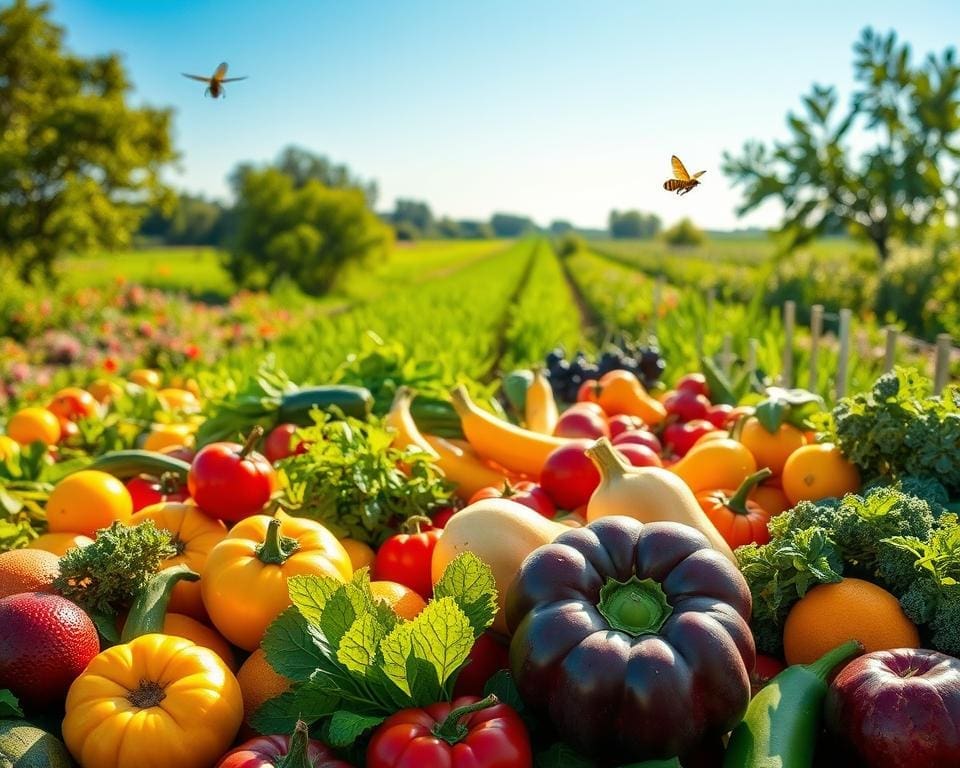In the quest for a cleaner diet, the significance of pesticide-free produce is gaining remarkable traction among consumers. With a rising awareness of the health implications associated with chemical use in farming, many are now turning to organic fruits and vegetables. Embracing produce grown without pesticides not only enhances personal health but also contributes to environmental sustainability. This choice transcends mere trendiness; it represents a vital lifestyle decision that promotes well-being. Understanding what qualifies as pesticide-free produce is essential for making informed choices in our everyday lives.
The Benefits of Pesticide-Free Produce
The choice to consume pesticide-free produce presents a variety of advantages that resonate with health-conscious consumers. By embracing organic fruits and vegetables, individuals can enjoy enhanced well-being through improved nutritional profiles, delightful flavours, and reduced risks associated with chemical exposure.
Enhancing Nutritional Value
Pesticide-free produce often contains elevated levels of essential vitamins and minerals. Research indicates that organic farming practices lead to greater nutrient density in crops. This inherently provides a noteworthy boost in the nutritional value of the foods that we consume daily. The benefits of pesticide-free produce are clear when considering the long-term health implications of such a foundation in our diets.
Improved Taste and Freshness
One of the most celebrated aspects of pesticide-free options is their improved taste. Many consumers report that organic produce possesses a remarkable vibrancy in flavour compared to their conventionally grown counterparts. This improvement is often attributed to the methods used in cultivating these crops, which prioritise natural processes. Enjoying these flavoursome foods can transform meals, making them not only healthier but also outrageously delicious.
Less Risk of Chemical Exposure
Choosing pesticide-free produce significantly lowers the risks associated with chemical exposure. Conventional farming often utilises various harmful substances that could linger on the surface of fruits and vegetables, posing potential health threats. Opting for organic alternatives allows individuals to minimise their intake of these substances, fostering both peace of mind and a healthier lifestyle in the long run.

Pesticide-Free Produce for a Cleaner Diet
Pesticide-free produce represents a significant step towards achieving better health and environmental sustainability. Understanding the impact of diet on well-being can lead to informed choices that foster a cleaner lifestyle.
Understanding the Impact on Health
The correlation between the consumption of pesticide-free produce and health impact is notable. Organic fruits and vegetables are cultivated without harmful chemicals that negatively affect human health. This choice reduces exposure to potentially dangerous substances, lowering the risk of various chronic diseases and promoting overall wellness. Eating a diet rich in chemical-free crops contributes not just to immediate health benefits but also supports long-term vitality.
Supporting Health-Conscious Consumers
A growing number of health-conscious consumers are steering their shopping habits towards organic and pesticide-free options. This shift stems from an increased desire for transparency in food sourcing and ethical farming practices. By choosing to support growers who adhere to sustainable farming methods, these consumers help promote healthier food systems that prioritize well-being and responsibility. Their choices create a ripple effect that encourages more farms to adopt organic practices, aligning the entire supply chain with the values of health-conscious individuals.
Environmental Benefits of Chemical-Free Crops
Opting for pesticide-free produce also yields considerable environmental benefits. Chemical-free crops foster healthier soil, enhance biodiversity, and reduce the contamination of water sources through sustainable agricultural practices. By minimising chemical runoff, these practices promote ecological balance, encouraging a thriving environment for future generations. The collective impact of choosing organic supports not only personal health but also the health of our planet.
How to Choose Pesticide-Free Produce
Making informed choices when you choose pesticide-free produce can greatly benefit your health and the environment. Understanding how to identify organic fruits and vegetables, finding the best shopping options, and knowing the importance of labelling and certification will empower you in your dietary journey. Below are essential insights to navigate your path.
Identifying Organic Fruits and Vegetables
Organic identification plays a crucial role in selecting produce free from harmful chemicals. Look for signs such as:
- Appearance: Organic fruits and vegetables often feature a more natural look, with minor imperfections.
- Price: While typically higher, reasonable pricing can hint at the product’s authenticity.
- Source: Buy from reputable suppliers that specialise in organic produce.
Shopping Smart: Where to Find Pesticide-Free Options
Implementing smart shopping tips can enhance your ability to find quality pesticide-free options. Consider these venues:
- Local farmers’ markets, where you can engage with growers directly.
- Organic grocery stores, which stock certified organic produce.
- Online shops dedicated to sustainable agriculture, offering a wide selection.
Understanding Labelling and Certification
Recognising proper labelling certification is key to ensuring the authenticity of your organic purchases. Look for recognisable seals such as the Soil Association and the USDA Organic Seal, which signify adherence to strict organic farming standards. Understanding these labels builds confidence as you transition to a cleaner diet.
The Role of Sustainable Agriculture in Pesticide-Free Practices
Sustainable agriculture plays a pivotal role in the promotion of pesticide-free practices, creating a harmonious balance between food production and environmental stewardship. By employing methods such as crop rotation, organic fertilisers, and biological pest control, farmers can significantly reduce or even eliminate the use of harmful chemicals. This not only contributes to a healthier ecosystem but also encourages biodiversity, essential for sustaining the planet’s delicate balance.
Furthermore, sustainable practices empower communities and support local economies by fostering eco-friendly eating habits. When consumers opt for produce grown through sustainable agriculture, they are not only choosing healthier options but are also endorsing a system that prioritises the well-being of both people and the environment. This conscious decision creates a ripple effect, inspiring more farmers to adopt methods that align with pesticide-free practices, ultimately enhancing the quality of life for all.
As individuals increasingly recognise the importance of their food choices, they become advocates for a more sustainable future. The integration of sustainable agriculture into daily life not only ensures access to nutritious, pesticide-free produce but also reinforces the value of eco-friendly eating—transforming our approach to food consumption and production. Together, we can pave the way for a cleaner, safer, and more sustainable agricultural landscape.








